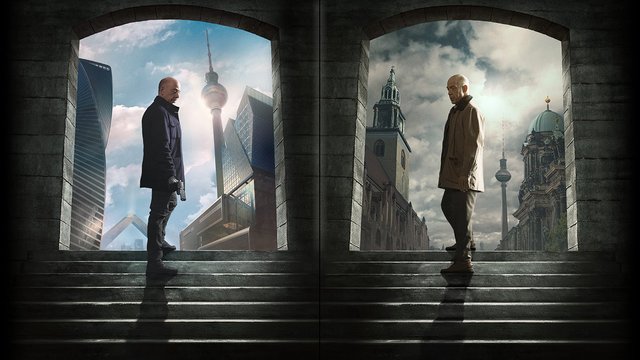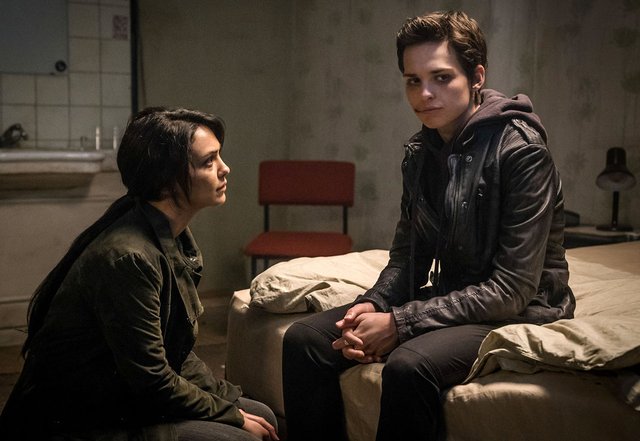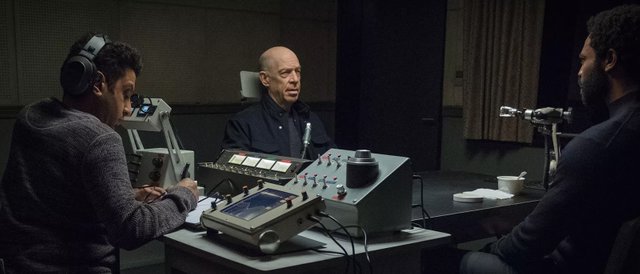OPINION | Counterpart, or the loneliness of discovering who we are

Hey, Mr. Silk... Looking fine in that "other universe", don't you? (?)
If there's anything you can't argue about Starz, is that they're pretty daredevil when it comes to their original programming. Even though they have always been the guy who watches the fight of the century between HBO and Showtime, since 2005, with the network favouring the idea of producing their own, high-quality content, Starz have been growing up in a steadfast, constant rhythm that usually doesn't get the credit they're due.
Starting with comedy, satire and talk-shows like The Bronx Bunny Show and Head Case, Starz started producing original content regularly since 2008, when they decided to adapt for TV the setting of Paul Haggis' landmark and award-winning movie, Crash (2004). Mildly received by critics and audience alike (it holds a rating of only 43 on Metacritic), it nevertheless managed to be an experiment attractive enough in marketing and ratings to put the aforementioned TV network in a good starting point for their long-term plans.
With Spartacus (2010-2012), Camelot (2011) and Da Vinci’s Demons (2013-2015), Starz flirted during some time with a more epic, history drama-kind of shows, achieving a somewhat inconsistent production level; though Spartacus evolved significantly, from being a singular Zack Snyder's 300 rip-off and guilty pleasure (some critics even catalogued it as softcore porn) to one of the best series of all time about life in the Roman Empire, their other approaches to what you could say the modern TV blockbuster weren't good or impressive enough to fight on even terms against a Showtime that, with shows like Homeland, Shameless and Ray Donovan, started to hold their ground in what was, nevertheless, a lost fight against the continued success of a gigantic HBO, which was just premiering a medieval fantasy mass phenomenon known as Game of Thrones.
Fortunately, that didn't do a thing to aminorate Starz' efforts and, in 2014, they started premiering shows that improved their standing with the audience significantly. Even though its start was relatively slow by today's standards, a daring, mature drama series which mixed the Golden Age of Piracy with Robert Louis Stevenson's all-time classic, Treasure Island, built its sacred ground among the best series of the 2010s: Black Sails. Following the huge success of that show with works like Power, Outlander and American Gods, Starz was on its way to be appreciated as a much juicier competitor against the great cable networks of USA, a network able to produce highly-attractive and dense stories, with both brains and brawn, for an audience that was already hungry for better content.
Finally, in december 2017, Starz gives us an offering that, considering the universal acclaim it has between critics and audience alike, might end up being not only the masterpiece of Starz' original programming to date, but one of the best science-fiction series of the year.
This article is about... Counterpart.
WARNING: This article might contain mild spoilers about Counterpart's plot, that I'll try to keep at the very minimum because… you should be watching the show, you know?
.jpg)
Berlin, Germany. In an unspecified date, which might be our present time, we meet Howard Silk, a low-level employee working for a United Nations bureaucratic agency known as the Office of Interchange, or OI. Howard has worked for 30 years in the OI's Interface division, doing mundane, monotonous tasks that involves exchanging cryptic, codified messages with other agents, with whom he isn't allowed to have any additional human contact besides the one needed to do his job. After finishing his daily work, Howard visits a local café to play the ancient game of go with a regular partner and apparent friend, against whom he seems to lose regularly. During the evening, Howard visits a hospital where we discover that his wife, Emily, has been in a coma for about six weeks before the start of the show. With heartfelt devotion, Howard brings her a bouquet of various flowers, always gifting one of them to the hospital's receptionist, and sits besides his convalescent wife to read poetry for her.
Howard has been living an extremely humdrum life for a very, very long time, and the show doesn't make the slightest attempt at hiding it. However, the dreariness of his life is destined to end sooner than he thinks; next day, just as he arrives to the regulatory security post in the building's entrance, his personal code is repeteadly denied. Before his strange situation starts to draw unwanted attention of other employees, a security guard escorts him to a high-clearance level below the ground floor, where he meets Peter Quayle, OI's young Director of Strategy, and Aldrich, the senior OI's Director of Housekeeping. Quayle notifies Howard that security registered a strange arrival to the building on that very morning that might be related to him and, after ordering Aldrich to bring what seems to be a detainee to the room, begs Howard to keep calm whatever may happen.
Aldrich enter the room again a few minutes later, bringing with him a hooded man, sitting him in front of Howard. As Aldrich removes the hood, Howard ends up facing a fact which he was clearly not prepared to swallow: apart from a clear difference in attitude, behaviour and, above all, manners, the man in front of him is essentially his doppelgänger. He is another Howard Silk. In the absence of a more precise term, he is the James Bond version of Howard; an outsider whose unexpected arrival forces Quayle to reveal a even more astonishing truth to Howard, minutes after his chilling encounter with his double.
During the Cold War, a scientific experiment that undoubtedly went wrong created a universe just like our own, connected through a dimensional passage that lies just below the Office of Interchange. Knowledge of this Crossing is the most jealously guarded secret of all time, one that changed Cold War forever; for, in modern times, it is not fought between the United States and a extinct Soviet Union, but between our universe and its duplicate version.
And Howard, as oblivious as he is to it, will be a crucial part of a interdimensional conflict whose consequences he can only barely imagine.
.jpg)
Believe me, if you watch the show and end up thinking about this... I'm not going to blame you
Even though it's enveloped on a pretty science-fiction and mystery package, as chapters begin to pass and situations begin to grow, Counterpart reveals itself as a speculative fiction masterpiece that works best as a peerless character study that it's both very pertinent for our time and a landmark of modern TV shows. Getting to know his other self affects Howard in deep, meaningful and unexpected ways: how is it even possible that, while he has been a loving, caring, introverted husband, impeccable and respectful of others - on a level pretty close to an inferiority complex - … his oher self is a ruthless, intimidating and outspoken-to-a-fault action man which is, to top Howard's amazement, one of the best spies of the duplicate universe' Division of Strategy, so far above his own laboral and political standing in the original universe? What could have happened at the other side to make Howard Prime, as fans name him, such a different man against pretty much the same background, the same circumstances and the same genetic material?
As if this weren't enough, the machinations of the plot do not only put Howard and his other self in the eye of the hurricane against the backdrop of a huge conspiracy that involves both universes and has been built over whole decades, but force them to face the mystery of a seemingly unstoppable female assassin (of which Howard Prime only knows her codename, Baldwin) that seems to have come from the duplicate universe to our own to kill certain targets, whose importance in the grand scheme of things will only be revealed in the closing moments of the season. The end which Baldwin is working for, even though it might end not being surprising enough for more clever, detective-kinds of modern spectators, will give a very interesting and novel insight to the nature of the conflict between both universes, in a way not that far away of Black Sails' own narrative explorations of the political and tactical minutiae behind high-seas, top-of-the-game piracy.

Why so serious, Baldwin?
But don't let yourself think that Counterpart might lose any kind of narrative tension because of that. The predictability of certain isolated elements of its story doesn't make the main plot less touching, inspired or powerful: in fact, it does quite the opposite. When Counterpart's first season ends, every single character's general standing has gone so, so badly compared to the beginning of the season that you can't even think a second season might be anything but an improvement in what hastily and deservingly becomes a gripping, thrilling drama. The only contentious point of this, maybe, is the way Baldwin's personal story (which initially is shown as a woman who is really a lot more than what meets the eye, far more that what Howard Prime's own thoughts about her and the whole spionage apparatus dedicated to pursuing her might assume) ends up being a secondary or even tertiary sub-plot, crushed beneath the enormous narrative weight that the main conspiracy plot of the season ends up having. But this is clearly just a speck of dust in an otherwise outstanding storytelling effort, specially given the way the show's main mystery - that is, the way the original experiment affected both worlds and created a protracted, cold, ruthless war of spionage between the two - casts a long, dark and addictive shadow above all other proceedings.
All things said, Counterpart is a character study above all, and oh, boy, you won't believe how brightly it shines in that regard. Being able to intimately know, not only the lives of the main characters, but the lives of their doppelgängers in the duplicate universe, allows for a tasty, intriguing insight into the nature of their existence. It helps a lot to know that, deeply on the inside (a thing that Counterpart's showrunner, Justin Marks, makes very clear on the behind-the-scenes footage), most of the show's characters are profoundly lonely and even alienated, a fact that only gets increased as they get to know their other selves. This very fact has varied consequences: it devastates Baldwin, but grows up to be a very important catalyst for change in Howard's own life.
Such is the importance of loneliness in the show's themes that its own internal mechanics make it stand out amongst all things; crossing amongst universes is, in fact, a very personal and lonely decision that you can only undertake all by yourself. Making use of an allegory to personal development and growth that is as crude as they come, we are shown various sequences in which we can see the characters and people of the world crossing the barrier between universes one by one; never in pairs, much less in groups, clarifying through careful use of lore and dialogue that (even though, regrettably, the scientific details underneath this particular characteristic of Counterpart's universe aren't clarified et al by the end of the season) making any kind of collective use of the Crossing is deeply unethical and amoral. It's such a powerful, deep conflict in this setting, that pretty much the whole season finale is related to this very fact… for reasons that, obviously, you'll have to discover as you watch it.

No, Howard, this is not about our old auntie Clementine's jewels...
This, of course, would be for naught if Counterpart wasn't built amongst acting performances of the highest quality available in show business and, fortunately, to say that the show's casting is outstanding is barely seeing the tip of the iceberg. The ensemble cast is perfectly balanced between highly-experienced actors that usually appear as secondary characters in more ambitious endeavours (which are allowed to have main roles here) with young promises of theatre and television, and various European indie actors that, even though they doesn't appear that often in Hollywood productions, end up giving a lot of more famous, well-known performers a run for their money. To my knowledge and preference, though, three of them clearly stand out:
- J.K. Simmons simply knocks it out of the park playing the Howards of both universes. The subtleties of the character work he does with them are simply stunning, and will be a very delightful conversation topic for playwrights, acting students and cinephiles alike, and, hopefully, will earn him what I expect to be a very fruitful award season next year (he should be at least nominated to the Emmys, the Globes, the Saturn, hell, he should be even nominated to guard Heaven's keys). Episode 8, aptly titled Love the Lie, is Simmons' stand-out performance of the whole season; it's probably one of the best scenes ever filmed for TV in this decade, unflinching, crude and intimate in its depiction of the way both Howards have grown as characters and have actually started to diverge, despise and hate each other.
- Nazanin Boniadi, an Iranian-British actress that has been the mainstay secondary character in a lot of well-known American TV shows, as well as some movie blockbusters of recent years, clearly shows her acting chops as the enigmatic Clare. I wouldn't allow myself to say more about her because, well, I could spoil you half of the first season's plot; suffice to say that, even though Clare appears to be just Baldwin's handler in the original universe, the plot slowly plays with her true identity and motivations la trama until she ends up being a central character of the whole series, being as close to a founding member of the conspiracy she can be. Even though she ends up saving herself by just a scratch from the season finale's acrid and troublesome fallout, she might have lots of trouble waiting for her in the next season.
- Olivia Williams, a well known British theatre, film and TV actress with a career long enough to compete with J.K. Simmons and Stephen Rea on equal terms, it's simply marvelous and captivating as Emily Burton Silk, Howard's wife in both universes. Even though we only see her as Emily Prime (understandably, given Emily's comatose status during nearly the whole first season), being an intelligence expert and field agent on par with Howard Prime's skills that, nevertheless, hides a deep sadness because of her terrible and complicated relationship with the more ruthless of the Howards. Her involvement with the investigation about the main conspiracy, as vital as it will be, will force her to admit very difficult, sad truths in her personal and work life.
MY FINAL THOUGHTS:
When you put a great, intimate story that touches very crude and deep aspects of human nature, a terrific, standout performance of an ensemble cast that constantly surprise you in each scene and moment of the season's main plot, and a series production that shines because of its high level of competence and moderation, which was done mainly on Berlin and Potsdam (cities that are literally allowed to breathe through the whole season), all together, you end up building Counterpart, a TV event worthy of watching and dissecting amongst friends. Usually, Starz original series needed a few episodes - or even a few seasons - to show their true colors; but Counterpart, in what it's just an incredible, fresh and outstanding storytelling masterpiece about the true meaning of identity, the discovery of self and what it really means to interact with other human beings, will catch you by your throat since day one and won't leave you at all…
… certainly, and in a way very much like its predecessor Black Sails did, way long after the story ends.
© Starz | Opening made by Imaginary Friends - Directed by Karin Wong
Hey, you read the whole article! Congratulations are in order!
Thank you for reading this piece about Counterpart, the first of many TV shows and movies I'm going to comment and analyse for your enjoyment. If you liked this post's content, write about it in the comment section; if you really liked it, feel free to think that the resteem button is something akin to the One Ring… it's… your precious (?)
And if you really, really loved it… Tell me if you would like me to do a episode-by-episode analysis of the whole series. Believe me when I say it, Counterpart deserves it!
You deserve more for this post. But with time the rewards would come. I'm a sucker for story contests by the way. You're sure to find some interesting contests to enter resteemed on my page.
And you should check out @calluna for her latest Tell Me a Story Contest post. You would love it!
Congratulations @bohemian.machine! You have completed the following achievement on Steemit and have been rewarded with new badge(s) :
Click on the badge to view your Board of Honor.
If you no longer want to receive notifications, reply to this comment with the word
STOPTo support your work, I also upvoted your post!